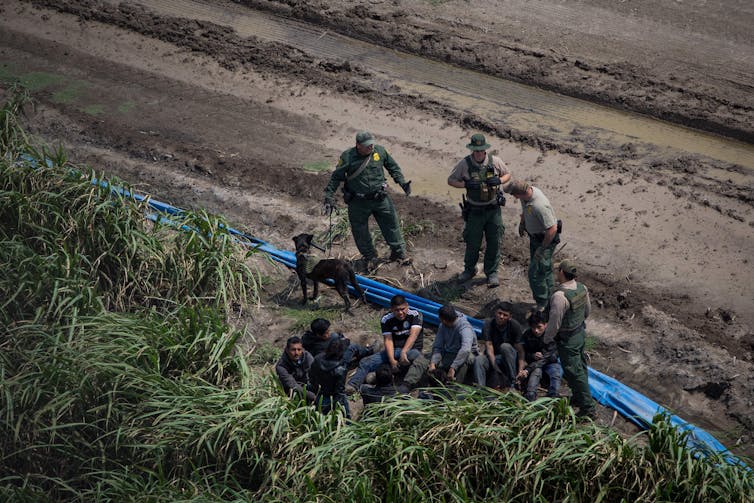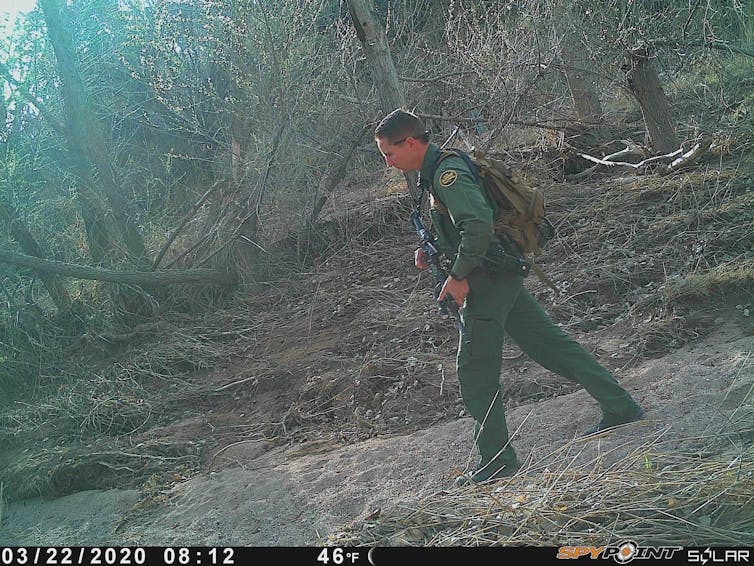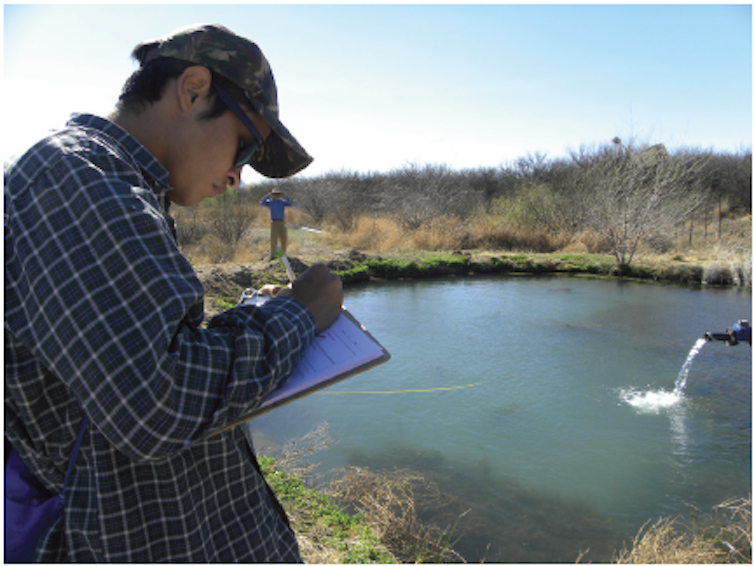Scientific fieldwork 'caught in the middle' of US-Mexico border tensions
- Written by Taylor Edwards, Associate Staff Scientist, University of Arizona
Imagine you’re a scientist, setting out camera traps to snap pictures of wildlife in a remote area of southern Arizona. You set out with your gear early in the morning, but it took longer than expected to find all the locations with your GPS. Now, on your hike back, it’s really starting to heat up.
You try to stick to the shaded, dry washes, and as you round a bend, you’re surprised to see several people huddled under a scraggly mesquite tree against the side of the steep ravine: Mexican immigrants crossing the border. They look dirty and afraid, but so do you.
“¿Tienes agua?” they timidly ask, and you see their empty plastic water containers.
This fictionalized scenario reflects a composite of real incidents experienced by U.S. and Mexican researchers, including me, on both sides of the border in the course of their fieldwork. While giving aid may be the moral thing to do, there can be consequences. Humanitarian aid workers in Arizona have been arrested for leaving food and water for migrants[1] in similar situations, and such arrests have risen[2] since 2017.
 In the course of their fieldwork, researchers can encounter migrants, Border Control agents and drug traffickers.
Loren Elliott/AFP via Getty Images[3]
In the course of their fieldwork, researchers can encounter migrants, Border Control agents and drug traffickers.
Loren Elliott/AFP via Getty Images[3]
The U.S.-Mexico border is a region of significant biological and cultural diversity[4] that draws researchers from a wide variety of disciplines[5], including geology, biology, environmental sciences, archaeology, hydrology, and cultural and social sciences. It is also an area of humanitarian crisis and contentious politics[6].
Migrants have always been a part of this area, but dangerous drug cartels and increasing militarization have added additional challenges for those who live and work here. U.S. and Mexican researchers are faced with ethical and logistical challenges in navigating this political landscape. To better understand these complex dynamics, my colleagues and I[7] conducted an anonymous survey among researchers who work in the border region to learn how border politics affect collaboration and researchers’ ability to perform their jobs.
 Camera traps meant to take photos of wildlife also capture images of the people traversing this landscape.
Myles Traphagen, CC BY-ND[8]
Camera traps meant to take photos of wildlife also capture images of the people traversing this landscape.
Myles Traphagen, CC BY-ND[8]
Border fieldwork comes with complications
Our[9] binational[10], multidisciplinary[11] group[12] of concerned[13] scientists[14] distributed[15] an anonymous, online survey to 807 members of the Next-Generation Sonoran Desert Researchers Network[16]. From this group of academic professionals, college students and employees of nonprofit organizations and federal and state agencies who work in the U.S.-Mexico border region, we received 59 responses. While not yet published in a peer-reviewed journal, a summary of our results can be found on the N-Gen website[17], and the original data is available online[18].
Researchers in our pre-pandemic study reported feeling safe for the most part while working in the U.S.-Mexico border region. However this may reflect the fact that they adjust their work to stay away from risky places.
Respondents noted the importance of knowing individuals and communities where they work. For instance, one U.S.-based researcher told us, “I feel safe in Mexico where I know landowners and they know me. I don’t feel safe in U.S. public lands due to Border Patrol’s extensive presence, their racial profiling ways and guns pulled on me.”
Many respondents reported having encountered situations during fieldwork when they felt their security was threatened, occurring relatively equally on both sides of the border. Participants did not express safety concerns due to migrants themselves, but instead pointed to the militarization and criminal activity associated with the region.
Safety concerns on the Mexico side were primarily due to drug cartels[19] and other criminal activity. Concerns in the U.S. centered on direct intimidation or “uneasy” or threatening encounters with U.S. Border Patrol, private landowners or militias.
As a result of safety concerns, many researchers from both countries reported their organization or employer had placed restrictions on working in the border areas of Mexico. In most cases, this meant limiting access to specific areas or requiring additional paperwork or approval through their institution.
Respondents reported logistical issues “altered or disrupted” their ability to perform fieldwork. These problems ranged from trouble crossing the border to difficulty obtaining necessary paperwork and permissions.
One researcher reported that permit delays for shipping scientific equipment across the border had stalled their research for over a year. More than half of respondents said these issues had increased in frequency or caused greater disruption to their work within the last three years.
Caught in the middle
Unsurprisingly, most researchers surveyed (69%) said they’ve encountered undocumented migrants while conducting fieldwork in the border region, although infrequently.
In situations of contact, migrants asked for assistance, such as food, water or a ride, a little over half of the time. Researchers drew a clear distinction between their willingness to offer food or water versus providing transportation.
Despite concerns about recent prosecutions of humanitarian aid workers in the border region, the threat was not sufficient to stop most respondents from taking action they viewed as moral or ethical.
“I would have pause given legal ramifications,” one person told us, “But I do not think this would change how I would act.” Survey respondents commented that they felt “caught in the middle” of an “impossible situation,” where the fear of prosecution conflicts with their moral imperative to help people in need.
 A volunteer collects data as part of an ongoing Borderlands Sister Parks project in Rancho San Bernardino, Sonora, Mexico.
Sky Island Alliance, CC BY-ND[20]
A volunteer collects data as part of an ongoing Borderlands Sister Parks project in Rancho San Bernardino, Sonora, Mexico.
Sky Island Alliance, CC BY-ND[20]
Overall our results suggest that research is affected by border policies in myriad ways: Restricted access[21] to areas reduces scientists’ ability to collect[22] comprehensive data, such as are necessary for conducting biodiversity inventories.
Restrictions directly affecting the ability of researchers to collaborate over international boundaries[23] can limit creativity and discovery. That can have long-term impacts, such as further separating countries’ ability to understand each other and foster meaningful partnerships catalyzed by science[24], including industrial innovation or ecological sustainability.
Societies have the right to enjoy the benefits of science[25]. This requires that scientists are able to collaborate internationally and to fulfill their functions without discrimination or fear of repression or prosecution.
[Deep knowledge, daily. Sign up for The Conversation’s newsletter[26].]
References
- ^ arrested for leaving food and water for migrants (www.nytimes.com)
- ^ such arrests have risen (www.npr.org)
- ^ Loren Elliott/AFP via Getty Images (www.gettyimages.com)
- ^ significant biological and cultural diversity (www.worldcat.org)
- ^ researchers from a wide variety of disciplines (careers.conbio.org)
- ^ humanitarian crisis and contentious politics (doi.org)
- ^ my colleagues and I (nextgensd.com)
- ^ CC BY-ND (creativecommons.org)
- ^ Our (tumamoc.arizona.edu)
- ^ binational (buhos.uson.mx)
- ^ multidisciplinary (nextgensd.com)
- ^ group (wildlandsnetwork.org)
- ^ of concerned (nextgensd.com)
- ^ scientists (carolynomeara.weebly.com)
- ^ distributed (www.researchgate.net)
- ^ Next-Generation Sonoran Desert Researchers Network (www.nextgensd.com)
- ^ N-Gen website (nextgensd.com)
- ^ original data is available online (doi.org)
- ^ due to drug cartels (doi.org)
- ^ CC BY-ND (creativecommons.org)
- ^ Restricted access (doi.org)
- ^ reduces scientists’ ability to collect (doi.org)
- ^ collaborate over international boundaries (doi.org)
- ^ meaningful partnerships catalyzed by science (theconversation.com)
- ^ enjoy the benefits of science (www.ohchr.org)
- ^ Sign up for The Conversation’s newsletter (theconversation.com)
Authors: Taylor Edwards, Associate Staff Scientist, University of Arizona

